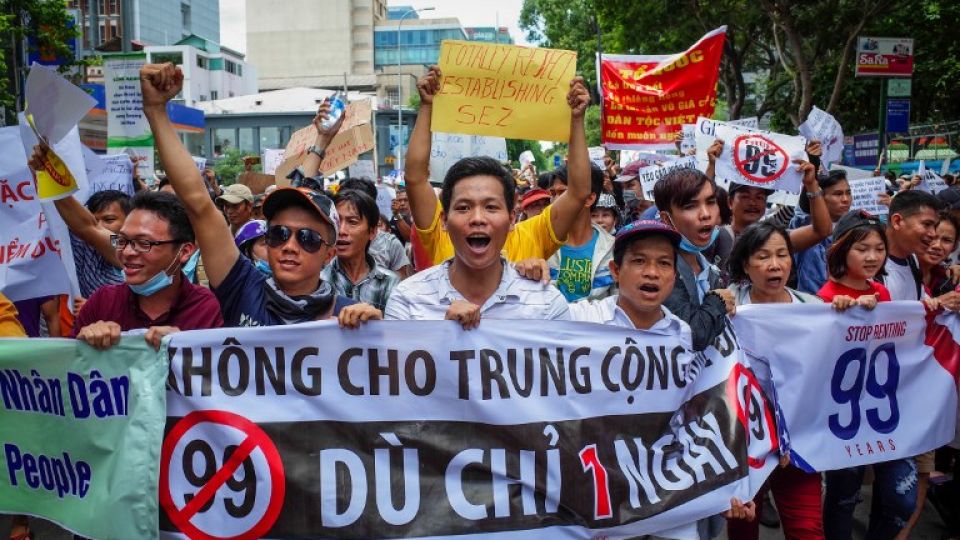June 13, 2018
Vietnamese protest against a proposed law which allows foreign investors to lease land for up to 99 years in three special economic zones (SEZs).
Protestors across Vietnam took to the streets on Sunday to oppose a controversial draft Law on Special Administrative and Economic Units which will allow foreign investors to lease land for 99 years in three proposed special economic zones (SEZs).
The government announced plans to establish the three new economic zones in the northern province of Quảng Ninh, the central province of of Khánh Hòa, and Phú Quốc Island last year, Reuters reported.
Aside from freeing would-be investors from the constraints of the usual local regulations, the proposed law for the new zones would also increase the maximum length of land leases from 70 years to 99 years.
Though the proposed bill does not mention China, many Vietnamese are concerned that Chinese investors will dominate the new zones, Reuters reported.
Vietnam’s relationship with its northern neighbor has long been a rocky one.
Both nations suffered heavy losses during a brief war in 1979 and have since repeatedly butted heads over the oil and natural gas-rich South China Sea.
Though a number of countries lay claim to the disputed area, China has repeatedly insisted that much of the sea falls within its so-called nine dash line, bringing it into conflict with other countries, including Vietnam.
Vietnamese protested in 2014 when a Chinese oil rig was set up off the nation’s coast, and the country dropped a major oil project with Spanish company Repsol earlier this year in response to pressure from China.
Vietnam has also complained of Chinese forces harassing fishing vessels.
Addressing rising public discontent over proposed legislation, which was originally scheduled for voting during the on-going fifth national assembly, Vietnamese Prime Minister Nguyen Xuan Phuc said last Thursday (June 7) that the government was considering reducing the 99-year lease, Reuters reported.
On Saturday morning, the government announced that the vote to approve the controversial new law had been postponed until the sixth national assembly in October.
Still, demonstrators took to the streets on Sunday, leading to scores of arrests and damage to property, according to local media.
In the southern province of Binh Thuan, protestors hurled rocks and homemade petrol bombs at police officers and damaged the headquarters of the provincial People’s Committee. The building’s fence was destroyed, and its sentry box and several rooms of the sentry force were burned, Vietnam News reported.
At least 45 police officers were injured and 102 protestors were arrested.
Deputy Minister of Public Security Nguyễn Văn Sơn called on Tuesday for an investigation into the the incident and strict punishments for the instigators, Vietnam News reported.
Protests also occurred in other areas of the country, including the capital Hanoi and Ho Chi Minh city, Vietnam’s economic centre.
Speaking before Monday’s National Assembly session, National Assembly Chairwoman Nguyễn Thị Kim Ngân called for calm, saying some people had misunderstood the nature of the matter and the bill’s content, leading to the incidents, Vietnam News reported.
She urged the people to believe in the party and state, which she claimed would listen when the people speak.
During the session, 85 per cent of NA deputies voted to postpone the adoption of the bill.


